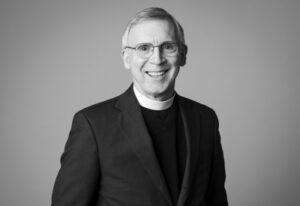 Dear Friends,
Dear Friends,
Have you made your New Year’s resolutions yet? You know the ones I’m talking about – the ones about getting more exercise, spending less time on social media, or finally getting organized. You haven’t? Me neither. It’s not because I have nothing to work on (the list is long!) It’s because I would be setting myself up to fail at keeping any of my resolutions past Groundhog Day.
The practice of making New Year’s resolutions is an ancient one. Archeologists believe that the first recorded people to make them were the Babylonians some 4,000 years ago. For them, the New Year began in March when crops were planted. Kings were crowned during the festival, or subjects renewed their loyalty to the reigning king. Commitments were made to pay any debts owed to the gods, and promises were made to returned anything that had been borrowed. Keeping promises meant that the gods would bestow favor on you. Failing to keep promises. . . well, that was no something one dared do in the ancient world where the gods could be capricious and the consequences dire.
The early Christians picked up on the religious aspect of making resolutions, and the first day of the year became a time when one thought about past mistakes and committed to doing better in the future. John Wesley, the Anglican priest (and co-founder of the Methodist Church) pioneered what we now know as “watch night” services. He intended the services to be an alternative to the boisterous celebrations. It was, he thought, much better to be singing hymns and reading scripture than to have people partake of the alcohol-soaked parties common at the time (and, of course, afterwards.)
Resolution-making these days is mostly a secular thing, with people making promises to themselves rather than to a deity. And what we typically resolve involves some kind of self-improvement. If we are honest, it’s hard for most of us to change patterns and habits even when we want to.
Here’s my alternative proposal – and quelle surprise, it is a throwback to the time when people’s resolutions were religious in nature:
Set a pattern of when you will attend church in person and follow it. (Note that I didn’t say, attend church more often – although I could get on board with that. No, what I am saying is set a pattern and stick with it.
When I was a first-year seminarian my advisor, Dick Norris, gathered his new advisees and told us to create a matrix of when we would attend services in the Chapel of the Good Shepherd. If I remember correctly, there were 19 services each week while school was in session (it was seminary after all, where clergy are formed for their lives of prayer.) Dr. Norris said, pick the ones you will attend and then go to those services whether you feel like it or not. Don’t go to the services that aren’t on your matrix even if you feel like it. Sounds strange, I suspect.
His point was our prayer lives should not be dependent on our feelings – that we ought to pray because God wants to be in relationship with us no matter what’s going on with us or how we are feeling – good days and bad days, happy times and sad times, times when we weren’t “feeling it” and times when we were. The point wasn’t our feelings. The point was responding to God’s deep desire to connect with us.
You may not be preparing for ordination, but Dick Norris’ counsel still pertains. At Trinity, we don’t have 19 services a week, we have (mostly) 8 each month. Pick some and show up.
How many should I pick, you ask? To give you a baseline, the Pew Research Center reports that 62% of Christians attend church once or twice a month. You know your current pattern. Maybe you want to continue it in 2024. If you attend Trinity once a month – to put it in percentages – if you attend one service a month, you are here for 12.5% of the services offered. No matter how many services you commit to attending in a month, stick with it.
By the way, what I’ve been talking about is not some kind of self-improvement program. The resolution is about you, to be sure, but it’s about your relationship with God through Jesus Christ and your relationship with your fellow members here at Trinity.
A lot will happen at Trinity in the next twelve months, and you get to decide how much you want to be part of it – anywhere from 0% to 100%. Have fun thinking and praying about it. Whatever you decide, Happy New Year!
Blessings,
Stephen Applegate
